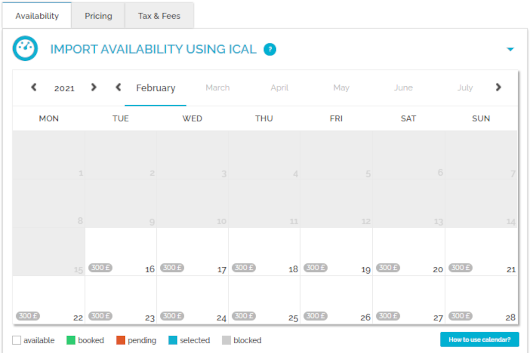Step 5: Price and availability
LOS pricing model
In LOS pricing, it is possible to specify fixed nightly pricing plans for different numbers of nights and (optionally) for different number of guests. It means that your prices can depend on the number of booked nights and guests staying at your property.
Here is how LOS pricing works. For example, let's say your Daily price is 200 USD. If you continue using the Daily price model and one guest decides to book your property for three nights - the total is 600 USD.
In case you use LOS pricing, you can easily set that one guest pays a different amount per night, depending on how many nights were booked. For example, 1 guest can pay 200 per night if a 3-night stay was booked - the total is 600 USD. But you can easily set that 1 guest can pay 190 USD per night if a 4-night stay was booked - the total is 760 USD.
You can do the same for the number of guests and set different prices for different cases.
FSP pricing model
Daily price model
Daily price model calculation is based on the values retrieved from various data fields. It allows for detailed pricing settings if set carefully. Also, Daily price model is based on seasons.
The season refers to a period of time when particular pricing is applied. It is possible to set as many seasons as required, varying in length and specification. The minimum settings require:
-
Season name,
-
Date range,
- Price.
Daily price

Daily price is the standard way of setting prices. It indicates the base price per night for the Standard number of guests.
Daily price is retrieved from TABS with the use of GET daterangeprice method.
|
|
Standard number of guests

Standard number of guests refers to the maximum number of guests included in the Daily price for whom the price does not change. If more guests than specified book a stay, the extra guests will be charged with the price set in the Extra guest price element.
Extra guest price (N/A)
Minimum stay

Minimum stay indicates the minimum number of days a reservation can be made for. Guests will be not be able to book your property if they want to book stays shorter than minim stay. This value is mandatory to provide.
Minimum stay value is retrieved with the GET availabilitybreaks method. Then, it is set according to the shortest stay possible at this property. This can be read from the "days" data point. In this case, the shortest possible stay is two-nights-long, hence minimum stay is set to 2.
|
|
Weekend pricing (N/A)
Occupancy pricing (N/A)
Complimentary topics
Discounts (N/A)
Calendar
Calendar stands for the property's availability to rent. You can check here the availability of your property in the selected time frames. Once a reservation is inserted in Rentals United, the availability in the calendar gets blocked for this period. The calendar is updated automatically every time the availability of the property changes or at predefined times to remain up-to-date.
Rentals United checks the "allowBookingOnWeb" setting during availability synchronization. If any year has "allowBookingOnWeb": false, then availability for the whole year is closed.
Availability is generated from GET availablebreaks endpoint. Every time availability is retrieved from TABS, Rentals United receives it in the following format. Whenever there are ranges with prices defined, this means the property is available to book.
|
|
Preparation Time Before Arrival (N/A)
Changeover restrictions

Changeover restrictions specify whether check-in or check-out is allowed for a given day. This is a great option if you need the guests checking in and out to fit your schedule and it will help you avoid unexpected guests. If some days are restricted from changeovers, then your guests will simply not be able to select such a stay if the start or end day falls on a changeover-restricted day.
Changeover restrictions are retrieved from TABS using the GET availabilitybreaks method. They are set across all the seasons according to the following rules:
-
by default, check-in and changeovers are not possible
-
if the price is "0", then changeovers are not possible
-
if the price is greater than 0, check-in is possible on "fromdate" and check-out is possible on "todate"
{"fromdate":"2019-02-12",
"todate":"2019-02-13",
"days":"1",
"price":"0"},-
Stay not possible
{"fromdate":"2019-02-12",
"todate":"2019-02-14",
"days":"2",
"price":"393"},-
2019-02-12: (arrival) > We have just set it to NONE in the previous line, but now the stay is possible, so CHECK IN
-
2019-02-14 : (departure) > CHECK OUT
{"fromdate":"2019-02-12",
"todate":"2019-02-15",
"days":"3",
"price":"465"},-
2019-02-12 (A) > CHECK IN
-
2019-02-15 (D) > CHECK OUT
{"fromdate":"2019-02-12",
"todate":"2019-02-16",
"days":"4",
"price":"557"},-
2019-02-12 (A) > CHECK IN
-
2019-02-16 (D) > CHECK OUT
{"fromdate":"2019-02-13",
"todate":"2019-02-14",
"days":"1",
"price":"0"},-
2019-02-13 (A), stay not possible > NONE
-
2019-02-14 (D) > NONE, but we have previously set it to CHECK OUT, so CHECKOUT
{"fromdate":"2019-02-13",
"todate":"2019-02-15",
"days":"2",
"price":"393"},-
2019-02-12 (A) > CHECK IN
-
2019-02-15 (D) -> CHECK OUT, but it was CHECK OUT already, so no change
{"fromdate":"2019-02-13",
"todate":"2019-02-16",
"days":"3",
"price":"465"},-
2019-02-13 (A) > CHECK IN
-
2019-02-16 (D) > CHECK OUT, but it was CHECK OUT already, so no change
{"fromdate":"2019-02-14",
"todate":"2019-02-15",
"days":"1",
"price":"0"},-
Stay not possible.
{"fromdate":"2019-02-14",
"todate":"2019-02-16",
"days":"2",
"price":"447"},-
2019-02-14 (A) > CHECK IN, but we remember we have set it to CHECK OUT before (a 2-night stay from 12th), so CHECK IN and CHECK OUT
-
2019-02-16 (D) > CHECK OUT, but it was CHECK OUT before, so no change
Tax (N/A)
Fee (N/A)
Down payment (N/A)
Security deposit

Security deposit is a mandatory or optional refundable charge the guest needs to pay to cover for potential property damages.
|
|


